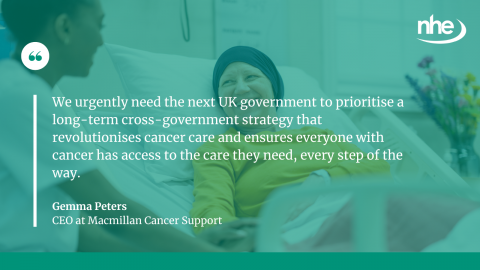As the culmination of the general election draws closer, a leading cancer charity has warned that the survival rates for the disease in the UK are 25 years behind some European countries and the sector is at “breaking point”.
Analysis from Macmillan Cancer Support shows that this country is a particular laggard compared to Scandinavian countries, with figures from the charity suggesting that the latest five-year survival rates for men with colon cancer in England (2021), and women with the same cancer in Wales (2020), are below what Sweden had achieved in 2002.
Survival rates for women with cervical cancer in England are some 25 years behind those observed in Norway, according to the charity.
This combined with workforce, waiting time, and resource pressures has cancer care at a terminus, with the third sector now calling for whoever forms the next government to commit to a long-term cross-government strategy to transform care.
Calls for radical action have not been few and far between in the build up to 4 July and the cancer care sector is no different, with a group of charities setting out its vision for children and young people with the disease just last week.
They highlighted the financial and emotional toll patients face, which is also a point raised by Macmillan — especially given the economic climate at the moment.

“Behind today’s shocking data are thousands of real people whose entire worlds have been turned upside down by cancer,” said Gemma Peters, CEO at Macmillan Cancer Support.
“They shouldn’t have to spend their days worrying about delays to their treatment or how they’ll be able to afford the petrol or bus fare they need to get to their next appointment; cancer is enough to have to deal with.”
“It’s clear that cancer care is at breaking point but this is a political choice and better is possible.”
“Together, with politicians and partners, we can transform cancer care for a more hopeful future for people with cancer and the people who support them,” added Peters.
“We urgently need the next UK government to prioritise a long-term cross-government strategy that revolutionises cancer care and ensures everyone with cancer has access to the care they need, every step of the way.”
Oncology expert, Dr Penny Kechagioglou, spoke to National Health Executive recently about going further in cancer care and what the future could look like.
Image credit: iStock



















